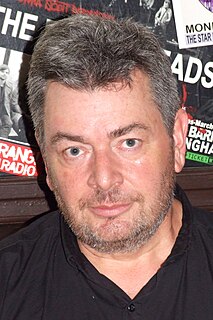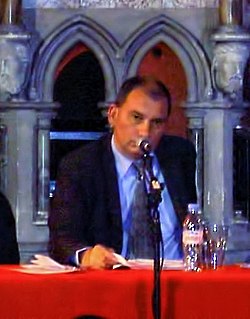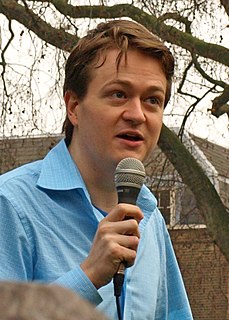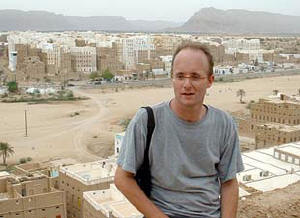
John Richard Pilger is an Australian journalist, writer, scholar, and documentary filmmaker. He has been mainly based in Britain since 1962. He was also once Visiting Professor at Cornell University in New York.

The New Statesman is a British political and cultural magazine published in London. Founded as a weekly review of politics and literature on 12 April 1913, it was at first connected with Sidney and Beatrice Webb and other leading members of the socialist Fabian Society, such as George Bernard Shaw, who was a founding director.
David Edwards is a British media campaigner who is co-editor of the Media Lens website with David Cromwell. Edwards specialises in the analysis of mainstream, or corporate, mass media, which are normally considered impartial or liberal, an interpretation both men believe is disputable.

Peter Jonathan Hitchens is an English author, broadcaster, journalist, and commentator. He writes for The Mail on Sunday and was a foreign correspondent reporting from both Moscow and Washington, D.C. Peter Hitchens has contributed to The Spectator, The American Conservative, The Guardian, First Things, Prospect, and the New Statesman. He has published numerous books, including The Abolition of Britain, The Rage Against God, The War We Never Fought and The Phoney Victory.

Media Lens is a British media analysis website established in 2001 by David Cromwell and David Edwards. Cromwell and Edwards are the site's editors and only regular contributors. Their aim is to scrutinise and question the mainstream media's coverage of significant events and issues and to draw attention to what they consider "the systemic failure of the corporate media to report the world honestly and accurately".
David Cromwell is a British media campaigner and oceanographer. With David Edwards, he is a co-editor of the Media Lens website.

David Morris Aaronovitch is an English journalist, television presenter and author. He is a regular columnist for The Times and the author of Paddling to Jerusalem: An Aquatic Tour of Our Small Country (2000), Voodoo Histories: the role of Conspiracy Theory in Modern History (2009) and Party Animals: My Family and Other Communists (2016). He won the Orwell Prize for political journalism in 2001, and the What the Papers Say "Columnist of the Year" award for 2003. He previously wrote for The Independent and The Guardian.

Nicholas Cohen is a British journalist, author and political commentator. He was a columnist for The Observer and a blogger for The Spectator.

Anthony Michell Howard, CBE was a British journalist, broadcaster and writer. He was the editor of the New Statesman and The Listener and the deputy editor of The Observer. He selected the passages used in The Crossman Diaries, a book of entries taken from Richard Crossman's The Diaries of a Cabinet Minister.

Spiked is a British Internet magazine focusing on politics, culture and society. The magazine was founded in 2001 with the same editor and many of the same contributors as Living Marxism, which had closed in 2000 after losing a case for libel brought by ITN.
Peter John Wilby is a British journalist. He is a former editor of The Independent on Sunday and the New Statesman.
Mark Curtis is a British author, historian and journalist who is the co-founder and editor of media organisation Declassified UK. He is also the author of several books on British foreign policy since the Second World War, including Secret Affairs: Britain's Collusion with Radical Islam, Unpeople: Britain's Secret Human Rights Abuses and Web of Deceit: Britain's Real Role in the World.
Brendan O'Neill is a British pundit and author. He was the editor of Spiked from 2007 to September 2021, and is its "chief political writer". He has been a columnist for The Australian, The Big Issue, and The Spectator.

James Mark Court Delingpole is an English writer, journalist, and columnist who has written for a number of publications, including the Daily Mail, Daily Express, The Times, The Daily Telegraph, and The Spectator. He is a former executive editor for Breitbart London, and has published several novels and four political books. He describes himself as a libertarian conservative. He has frequently published articles promoting climate change denial. and expressing opposition to wind power.
Paul Michael Dacre is an English journalist and the former long-serving editor of the British right-wing tabloid the Daily Mail. He is also editor-in-chief of DMG Media, which publishes the Daily Mail, The Mail on Sunday, the free daily tabloid Metro, the Mailonline website, and other titles.

Johann Eduard Hari is a British-Swiss writer and journalist who has written for The Independent and The Huffington Post. In 2011, Hari was suspended from The Independent and later resigned, after admitting to plagiarism and fabrications dating back to 2001, and making malicious edits to the Wikipedia pages of journalists who had criticised his conduct. He has since written books on the topics of depression, the war on drugs, and the effect of technology on attention spans.
Anthony Hayward is a British journalist and author. He is a regular contributor to The Guardian, The Daily Telegraph and The Independent, and has written more than 20 books about television and film. The subjects of justice and censorship have been constant themes throughout his work. "Hayward is particularly good on conflicts with authority," wrote one critic reviewing his biography Which Side Are You On? Ken Loach and His Films.

Jonathan Cook is a British writer and a freelance journalist based in Nazareth, Israel, who writes about the Israeli–Palestinian conflict. He writes a regular column for The National of Abu Dhabi and Middle East Eye.
Ian Cobain is a British journalist. Cobain is best known for his investigative journalism into human rights abuses committed by the British government post-9/11, the secrecy surrounding the British state and the legacy of the Northern Ireland's Troubles.

Utopia is a 2013 documentary film written, produced and presented by John Pilger and directed by Pilger and Alan Lowery, that explores the experiences of Aboriginal Australians in modern Australia. The title is derived from the Aboriginal homeland community of Utopia, Northern Territory, one of the poorest and most desolate areas in Australia.











